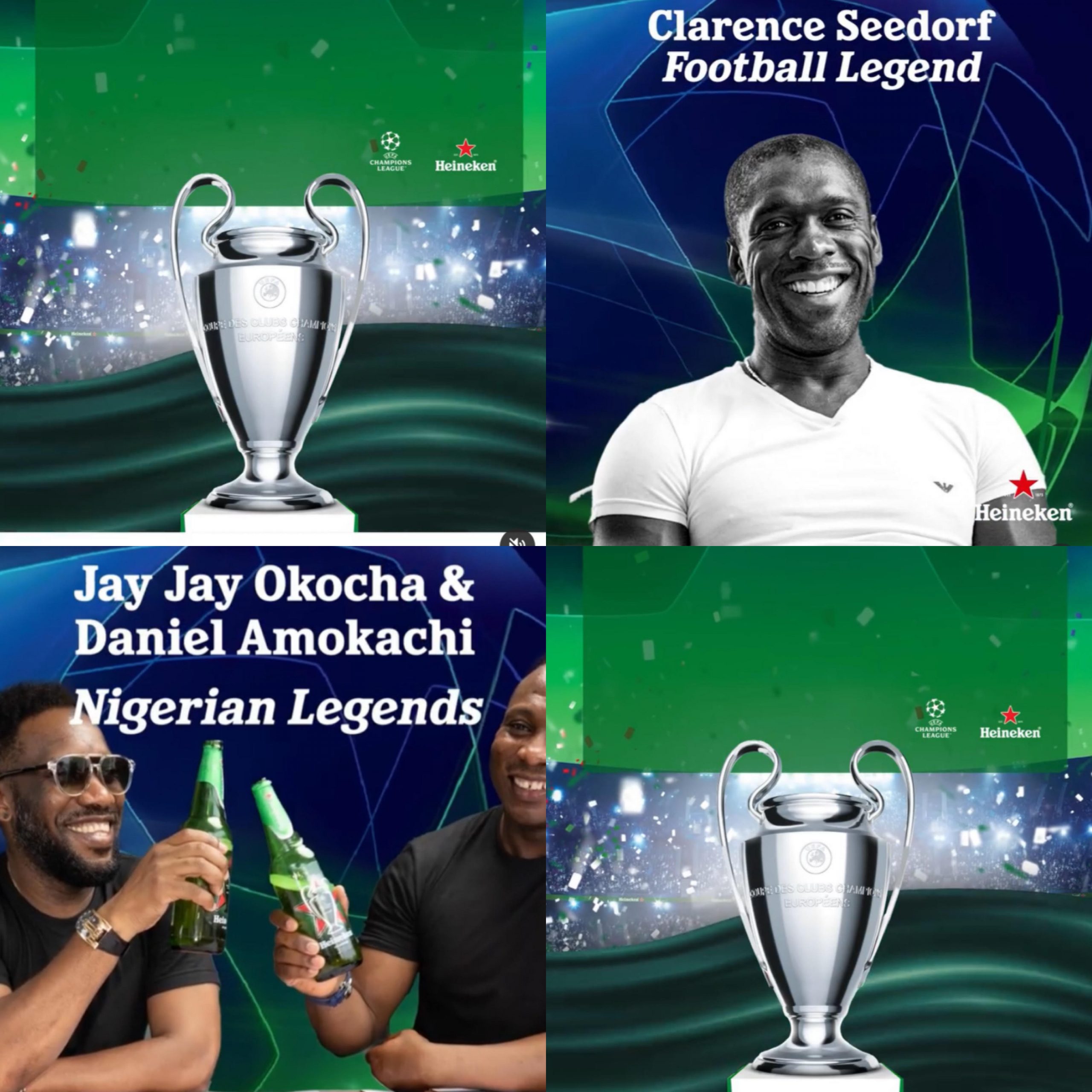By Tunde Animasaun
Brand building is a serious, strategic, and never-ending business. The Heineken brand does not only know and is adept at this, it is the champion of the game, constantly inventing and reinventing itself to stay atop. This informs the brand’s long association with the UEFA Champions League, the world’s most prestigious league, a relationship that has spanned well over 26 years.
Since berthing on the shores of Nigeria in 1946 as a premium brand, Nigerian Breweries, owners of the brand in Nigeria has accorded Heineken a premium marketing and advertising attention. And premium, it has stayed in the mind of the consuming public.
The UEFA Champions League Trophy Tour Presented by Heineken is a chance for football fans around the world to get closer to the iconic tournament. It was developed to enable fans globally to have the chance to get closer to the UEFA Champions League competition and the trophy itself. The 2021/22 Heineken’s UEFA Champions League campaign titled, “Cheers to All Fans”, highlights that football belongs to all passionate fans and challenges the stereotype that football belongs to men.
Meanwhile, the COVID-19 global pandemic has resulted in a paradigm shift that has continued to defy the consumer behaviour theories taught in marketing schools. Suddenly, the cliché that ‘consumer is king’ became a larger than life reality with consumers dictating the ‘where’, ‘how’ and ‘when’ to be engaged. With the advancement in technology and the power it confers, consumers moved to the digital thus satisfying their quest for convenience and mobile engagement. As a brand on top of its game, Heineken was abreast of this development if not a step ahead as it had started the deployment of digital to attract new consumers – pre-pandemic.
According to a report by MarketingWeek, “in December 2018, 8% of consumers used only traditional channels to follow the UEFA Champions League, dropping to 3% in June 2019. At the same time, those only watching digital channels rose from 12%to 14% with this two percentage point rise representing 18 million consumers.
“The brand discovered that many of its consumers watching the UEFA Champions League, which it sponsors, were doing so through digital devices only, meaning they wouldn’t see activations taking place in so-called traditional media. It noted, working with Blauw Research, that globally, more than eight out of 10 people followed the league using at least one digital channel (for example online live streams or social media), while approximately one in six of them exclusively used digital channels to follow matches.”
This has only increased over time.
To reach this digital audience, in 2018 and 2019 the beer giant ran a direct-to-consumer initiative in Amsterdam called Drinkies. This was an e-commerce channel that enabled cold beer and snacks to be delivered to consumers’ doors within 60 minutes of ordering.
During the UEFA Champions League knock-out stage in spring 2019, sales of Drinkies showed a considerable uplift on match days. This was especially the case when the home team – Ajax – was playing.
Not only did sales increase, but data also showed that the number of new Drinkies customers grew. Comparing sales data with brick and mortar retail sales on the same matchdays showed an improved uplift for Drinkies sales.
Heineken used this case study to demonstrate that brand communication through UEFA Champions League sponsorship, combined with direct-to-consumer instant delivery, reached new customers and ultimately increased overall penetration. It also showed how combining clear marketing with direct-to-consumer initiatives can be.
Walter Drenth, who was global CMO for global international brands for craft at Heineken but is currently taking a sabbatical (as of 2020), explained: “What you see is that there is a group of people who only use digital media channels and digital devices exclusively. And if you add those devices and digital media channels you enlarge the total group (you are reaching) who include non-users of the brands.”
This rear-view approach is to lay the basis for understanding this interpretative attempt at unfolding the branding and marketing strategy behind the UCL Trophy Tour.
Now in its 13th year, the tour has reached 31 countries across Africa, Asia, and North and South America thereby strengthening the tripartite relationship between the brand, the league, and the fans across the globe.
Riding on the crest of football legends like Clarence Seedorf, Messi, Ronaldinho, JayJay Okocha and others who are iconic brands of the UEFA League, Heineken, the global iconic premium beer brand has, through the tour, succeeded in capturing attention and, perhaps, the hearts of the captive and fanatical football audience all over the world.
There is an added twist this year. Making Davido, the popular Nigerian music brand the captain of Team Nigeria that included Nigerian football legends such as JayJay Okocha, Daniel Amokachi, and Taribo West, and other music stars like Darey and MI that played against the Seedorf-led Heineken Team has generated another level of talkability around the brand. However, the internet and social media reverberated for days with discussions on the appropriateness or otherwise of Davido captaining Jay Jay. Whether intended or not, the social media attention is not a bad one for the brand.
What remains to be seen is whether these influencers will deploy the content from the event on their handles.
| ReplyForward |






Comment
No comments found.